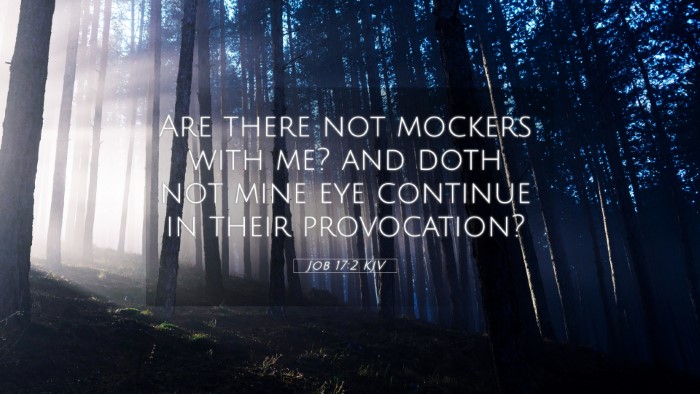Old Testament
Genesis Exodus Leviticus Numbers Deuteronomy Joshua Judges Ruth 1 Samuel 2 Samuel 1 Kings 2 Kings 1 Chronicles 2 Chronicles Ezra Nehemiah Esther Job Psalms Proverbs Ecclesiastes Song of Solomon Isaiah Jeremiah Lamentations Ezekiel Daniel Hosea Joel Amos Obadiah Jonah Micah Nahum Habakkuk Zephaniah Haggai Zechariah MalachiJob 17:2 Similar Verses
Job 17:2 Cross References
Are there not mockers with me? and doth not mine eye continue in their provocation?
Uncover the Rich Themes and Topics of This Bible Verse
Listed below are the Bible themes associated with Job 17:2. We invite you to explore each theme to gain deeper insights into the Scriptures.
Job 17:2 Cross Reference Verses
This section features a detailed cross-reference designed to enrich your understanding of the Scriptures. Below, you will find carefully selected verses that echo the themes and teachings related to Job 17:2 KJV. Click on any image to explore detailed analyses of related Bible verses and uncover deeper theological insights.

1 Samuel 1:6 (KJV) »
And her adversary also provoked her sore, for to make her fret, because the LORD had shut up her womb.

Job 12:4 (KJV) »
I am as one mocked of his neighbour, who calleth upon God, and he answereth him: the just upright man is laughed to scorn.

Job 13:9 (KJV) »
Is it good that he should search you out? or as one man mocketh another, do ye so mock him?

Psalms 91:1 (KJV) »
He that dwelleth in the secret place of the most High shall abide under the shadow of the Almighty.

Psalms 35:14 (KJV) »
I behaved myself as though he had been my friend or brother: I bowed down heavily, as one that mourneth for his mother.
Job 17:2 Verse Analysis and Similar Verses
Understanding Job 17:2
Job 17:2 states: "Are there not mockers with me? And does not my eye dwell on their provocation?" This verse is a poignant expression of Job's deep anguish and the heavy burden he carries amidst his suffering. Through the lens of various public domain commentaries, we can glean a comprehensive understanding of Job's predicament.
Verse Context and Background
Job, a man of great integrity and piety, is grappling with immense suffering that has come upon him without apparent cause. This chapter conveys Job's ongoing dialogue with his friends, who have relentlessly questioned his righteousness, thus provoking him further. Job's reflections lead to a deeper discourse on the nature of suffering and divine justice.
Commentary Insights
-
Matthew Henry:
Henry emphasizes the emotional toll of Job's trials. He notes that the presence of mockers amplifies Job's sorrow, highlighting a common human experience of feeling judged and ridiculed during times of suffering. The verse illustrates Job's awareness of the derision surrounding him, which adds to his grief.
-
Albert Barnes:
Barnes focuses on the rhetorical question posed by Job, emphasizing the loneliness and scorn he feels. The mockers symbolize the unjust perception of his friends, who fail to understand the depth of his situation. Barnes connects this to the broader biblical theme of righteous suffering, noting that Job's plight reflects the experiences of many faithful believers.
-
Adam Clarke:
Clarke suggests that Job’s mention of mockers serves not only to reflect his immediate emotional experiences but also to underscore a spiritual crisis. He draws connections between Job’s lament and the prophetic messages found in the scriptures that address the plight of the faithful under persecution and mockery.
Thematic Connections and Cross-References
Job 17:2 links to several significant themes within the scripture, particularly the struggles of the righteous amidst suffering and the nature of mockery in the face of faith. Here are some pertinent cross-references that help illuminate the depth of Job's statement:
- Psalm 22:7-8: "All who see me mock me; they hurl insults, shaking their heads." This verse captures the essence of being mocked in times of deep distress.
- Matthew 27:39: "Those who passed by hurled insults at him, shaking their heads." This New Testament parallel relates the experience of mockery as seen in both Job and Christ.
- Proverbs 3:34: "Surely he scorns the scorners: but he gives grace unto the lowly." This verse provides insight into God's response to mockery, amplifying Job's feelings of being unjustly judged.
- Lamentations 3:14: "I have become a laughingstock to all my people, the object of their taunts all day long." This speaks to the deep sense of isolation Job feels.
- Luke 16:14: "The Pharisees, who loved money, heard all this and were sneering at Jesus." This illustrates how the righteous can often be shunned by the very ones expected to provide support.
- 1 Peter 4:14: "If you are insulted because of the name of Christ, you are blessed." This verse positions mockery as a form of blessing in the eyes of God.
- Job 16:10: "Men open their mouths to jeer at me; they strike my cheek in scorn and unite together against me." This is Job reflecting on the mockery aimed at him specifically.
- Matthew 5:11: "Blessed are you when people insult you, persecute you and falsely say all kinds of evil against you because of me." This beatitude echoes the foundational theme of finding blessing in trials.
- John 15:18-19: "If the world hates you, keep in mind that it hated me first." This connection further emphasizes the theme of suffering due to faithfulness.
- Philippians 1:28: "Without being frightened in any way by those who oppose you. This is a sign to them that they will be destroyed, but that you will be saved." This speaks to the strength of faith in the face of mockery.
Cross-Referencing Biblical Texts
Cross-referencing Bible verses, such as Job 17:2, opens a deeper understanding of interconnected scriptural meanings. Tools for Bible cross-referencing, such as a Bible concordance or cross-reference guides, can assist believers in exploring these connections. Here are some helpful approaches for cross-referencing:
- Identify Themes: Look for common themes across different books, such as the theme of suffering and mockery.
- Contextual Study: Examine the context of each reference to see how they contribute to the understanding of similar struggles.
- Study Gospels Parallels: Investigate how the stories and struggles of characters in the Old Testament are reflected in the New Testament.
- Utilize Digital Tools: Use digital Bible study tools and apps that provide cross-referencing features to enhance your study.
Conclusion
The profound expression found in Job 17:2 resonates through the ages, posing pertinent questions about human suffering and the nature of faith under duress. Through cross-referencing Job's feelings of mockery and scorn with other key biblical passages, one can better understand the consistent messages of resilience and the hope found in God’s justice. This thematic exploration invites further study and encourages believers to reflect on their personal experiences of faith in adversity.






